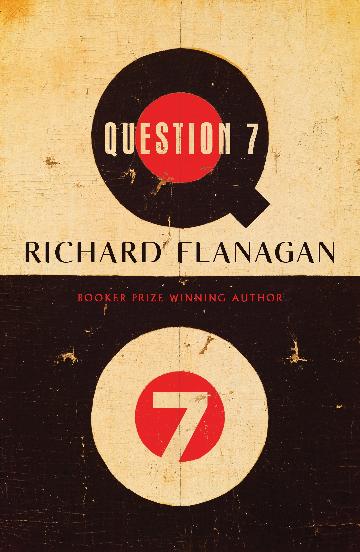Richard Flanagan
Question 7
Question 7
Couldn't load pickup availability
Susan's Review
Acclaimed author Richard Flanagan’s new book is the brilliant culmination of 16 works of fiction and non-fiction, in which he brings together the issues that have preoccupied him for decades. A profound love of family and the natural world; the ravages of war; the destructive effects of colonisation on Australia’s First Nations people; the dehumanising effect of class divisions; and the human capacity for cruelty and kindness, for ignorance and reason.
Part memoir, part history, part impassioned social commentary, Question 7 examines the role of chance in global politics and in the lives of ordinary people. In the global context, for example, the famous writer H.G. Wells kisses the controversial journalist Rebecca West and seeking distraction from her powerful effect on him, writes one of his lesser-known novels, The World Set Free. The book will later be read by Hungarian physicist Leo Szilard, fuelling ideas about the possibility of a nuclear chain reaction that will, despite his persistent efforts to thwart its production, result in the creation of the atomic bombs dropped on Hiroshima and Nagasaki.
In the personal context, Flanagan’s father barely survives three brutal years as a slave labourer in a coalmine under the Inland Sea, south of Hiroshima, and is saved by the dropping of those bombs and the consequent Japanese surrender. But notwithstanding the role of such gruesome chance in human affairs, Flanagan also denounces the deliberate and systemic use of violence that blighted the Indigenous population of Tasmania, and the greed that led to the destruction of his beloved Tasmanian landscape.
Question 7 is a lament for all that is lost – the lives, the habitat, the possibility of cross-cultural understanding - and an insistence that we are all complicit in the horrors of history. This is a must-read book: ethically provocative, deeply moving and beautifully written, it is acknowledges both the limits of language and the necessity to affirm the values of love, forgiveness and compassion.
Nick's Review
Flanagan's book offers a contemplative read- examining life and the interplay between our personal journeys and those of others, and how this shapes our own narrative.
The book traverses the love affair of H. G. Wells and Rebecca West's, continuing through the advancement of nuclear physics in the 1930s, and culminating in Flanagan's father's experience as a slave laborer near Hiroshima at the time of the atomic bombing.
Question 7 feels very much like a book of our times with the underlying history of the West's ongoing existential crisis of nuclear disaster, permeating through the pages. Flanagan notes that he has dreamt part of the book and you do feel the subliminal weight of history subtly woven in from the author's dreams.
This book is a meditative journey through life, inviting you to reflect on your own path - a truly satisfying read!
Penguin's Q&A with the Author:
Where did the title Question 7 come from?
I like titles with numbers – Catch-22, Fahrenheit 451, 1984 – because they mean nothing to you until you read the book. Afterwards, you can never again hear those titles without thinking of the central paradox of each book. And so too, I hope, with Question 7.
This book refers, at times, to your own life and your family history. What was it like reflecting on your past – and how did you decide what to include (and what to leave out) in Question 7?
I didn’t really write this book at all. I dreamt it.
To the extent I interfered with the dream, it was only to remove pieces of writing that were not dreams.
Publishers Overview of the author
Richard Flanagan's novels have received numerous honours and are published in forty-two countries. He won the Booker Prize for The Narrow Road to the Deep North and the Commonwealth Prize for Gould's Book of Fish. A rapid on the Franklin River is named after him.
Share


